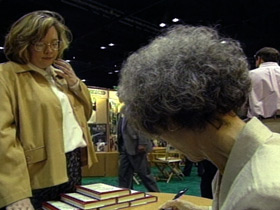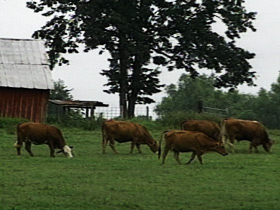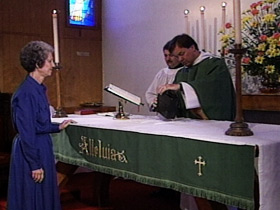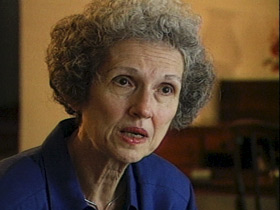Phyllis Tickle
BOB ABERNETHY: Now a profile of a perceptive, gregarious, devoted, and down-to-earth writer and editor from Tennessee. Who can resist the woman named Phyllis Tickle?
ABERNETHY: Phyllis Tickle lives intensely.
Ms. TICKLE: Marvelous. Okay, give me his name.
PHYLLIS TICKLE (Author and Editor): Hi, there. How are you?

ABERNETHY: Signing copies of her latest book at a booksellers’ show.
Ms. TICKLE: Want to swap with me?
Unidentified Woman: All right.
Ms. TICKLE: All right.
ABERNETHY: Working the floor, talking to publisher representatives. Getting the story of what’s new in religion books.
Ms. TICKLE: Can you put a percentage on the increase of children’s activity?
Unidentified Man: For us, probably about 30 percent.

ABERNETHY: How does a 64-year-old mother of seven, a contributing editor of PUBLISHERS WEEKLY, an author and religious book expert much in demand for interviews and speeches, on the road about half the time, how does this woman keep her balance? Mrs. Tickle and her husband of 42 years, Sam, a doctor, live in the country near Memphis. They moved out of the city because they wanted their children to learn the lessons of living close to the earth.
Ms. TICKLE: The first thing is that out here, we’re not the measure of anything. We’re never going to win out here. Do you know what I mean? The whole enlightenment in western civilization in the last 300 years has been built on the notion that man is the measure of all things. That’s bull. Man’s the measure of absolutely nothing. But you forget that when you’re in the city and everything is scaled to man. Everything I touch here is alive. Out here nothing is an object. You’re caught in majesty that doesn’t require anything of you except just the sense of yes, it’s here, and God bless me for the time I’m part of it. How wonderful to be part of it. The problem with that can be that if you’re not careful, it becomes an earth faith, a wonder of the natural world, and is not theologically rooted.
ABERNETHY: As much as she loves nature, Mrs. Tickle believes in theological roots. She respects Christian, New Age, and other kinds of spirituality, but she says she also needs the community of her church, the discipline of theology, and especially the Eucharist. Communion is so important to Phyllis, she often delivers it herself.

Unidentified Man: Phyllis, in the name of the congregation, I send you forth bearing these holy gifts.
ABERNETHY: She tries to get the consecrated bread and wine to sick friends shut in at home before her parish service is over.
Ms. TICKLE: The peace of the Lord be always with you.
Unidentified Woman #1: And also with you.
Ms. TICKLE: Let us pray.
Unidentified Woman #2: Amen.
ABERNETHY: Phyllis says for her, at this moment, Jesus is present in spirit. Another discipline Phyllis says she needs is what monks call the daily offices. Four times a day she retreats to this room to read the Psalms and prayers designated for those hours by St. Benedict 1,400 years ago.

Ms. TICKLE: I’m not quite sure what it was in me that yearned for that extra discipline, but when you go out into the spiritual world, you need some kind of anchor, or maybe I did, that keeps your focused on God, but there’s something far more subtle and gripping about that. It gives up ownership of self, and it’s when that ownership is given up that freedom comes.
ABERNETHY: Phyllis Tickle has spent her life not only writing, publishing, farming, and being a wife and mother, but also keeping the daily offices at 9, 12, 3, and in the evening, every day for 30 years.

